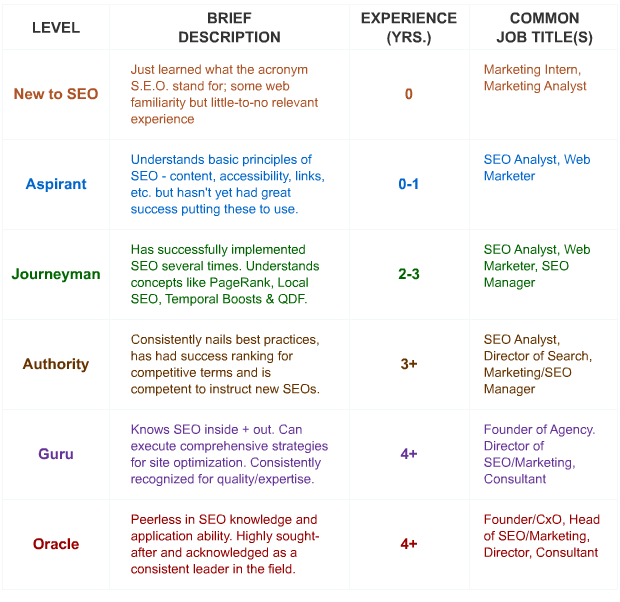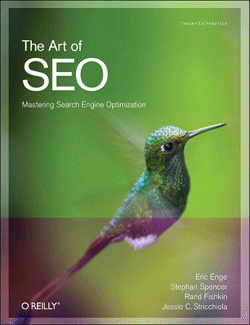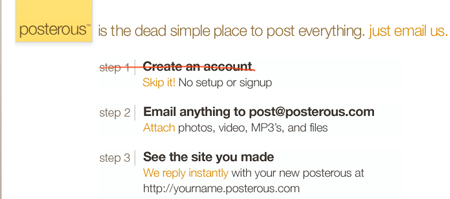
6 Ways to Learn SEO
The author's views are entirely their own (excluding the unlikely event of hypnosis) and may not always reflect the views of Moz.
Without a doubt, one of the most frequent questions we receive here at Moz is "How to get started in SEO?" Here, let me attempt to answer this common question.
In this post, I'm going to cover the responses I give most often and those I've seen have the most success. But, before I describe each of these, it pays to understand that not all learning methodologies are the same in style, substance or where they can take you. If you're completely new to SEO, some of these won't be appropriate and if you're already a veteran, others won't teach you much you don't already know.
Thus, let's start with a chart of relative knowledge/experience levels (similar to this old/outdated post on levels of knowledge):

Now that we have some context, let's dive in to the ways I recommend learning SEO. For each, I've provided a description of the process, the ideal starting level(s) (and where you can expect to reach via that methodology) and a list of resources with my notes.
#1 - Free Online Guides

A number of free guides, eBooks and downloadable PDFs exist on the web to help provide insight into SEO. Some are highly comprehensive while others touch only lightly on the topic. The key to being successful with this process is to identify guides that are both up-to-date and accurate in their recommendations. No council exists to regulate the dispersal of SEO information and thus, a few proprietors of free guides can lead you down incomplete or even dead wrong paths.
Recommended for: New to SEO, Aspirant, Journeyman
List of Resources:
- SEOmoz's Free Beginner's Guide to SEO (just updated for 2010)
- Google's Starter Guide for Webmasters
- Danny's Checklist for Learning SEO
Time Investment / Commitment Required: 1-3 hours should get you through any of the guides above
#2 - Published Literary Works

For those who like to curl up with a book, a number of authors/publishers have come out with solid resources in the past couple years. Books have a unique advantage over online guides in that they're often better written, more carefully edited and can be more easily judged on the reputation of the authors/publishers. Conversely, they are hard to update (even in the book I wrote last year, a few links and references are already broken) and thus, don't always contain the most up-to-date information.
Recommended for: New to SEO, Aspirant, Journeyman
List of Resources:
- Inbound Marketing by Dharmesh Shah & Brian Halligan
- Search Engine Optimization: Your Visual Blueprint for Effective Internet Marketing by Kris Jones
- Search Engine Optimization Secrets by Danny Dover
- Marketing in the Age of Google by Vanessa Fox
- Search Engine Optimization: An Hour a Day by Jennifer Grapone & Gradiva Couzin
- The Art of SEO by Rand Fishkin, Jessie Stricchiola, Eric Enge & Stephan Spencer
Time Investment / Commitment Required: The largest of these is ~450 pages, which might take between 4-8 hours depending on how fast you read
#3 - Blogs, Forums & Search Communities

In my opinion, everyone learning SEO can garner value from discovering 3-5 favorite sources of information online and keeping up to date with each on a daily or weekly basis. Forums and blogs pump out a tremendous quantity of content, but just by browsing the headlines and reading teh stories that stand out, you can get exposure to strategies, techniques, news and trends that would otherwise be difficulty to stumble on by yourself.
Many SEOs (myself included) first learned the practice almost entirely through contributions, questions and threads on industry blogs & forums. Today, I'd suggest starting with a base from a free guide or book, then diving into the communities to stay sharp and get individual questions answered. I've provided a few of my personal favorite resources below, but will be working on a more comprehensive list in the near future.
Recommended for: All
List of Resources:
- Forums / Q+A
- Blogs
- Other
Time Investment / Commitment Required: 30-45 minutes per day or 90 minutes per week (if you aggregate your time into a single slot)
#4 - Building Sites & Earning Rankings

Many in the SEO field will say that building your own sites and practicing SEO in the real world is the only way to learn. I disagree with that message, but I do concur that it's possibly the most crucial step to advancing your career and abilities.
My view is that if, prior to building a site and attempting to earn some rankings, you have a great mental model of the field, you can build a truly defensible strategy for your site(s). If you simply register a domain that sounds nifty and start trying to rank for a keyword you think is popular, you can get a very warped sense for how to do SEO and what matters in the short, medium and long run. At the very least, read a free guide and engage a bit on some of the online communities.
Once you've got a base of knowledge, building a site is the next logical step. I strongly suggest starting small and preferrably with a topic that you're personally passionate about rather than one that just has high AdSense payouts. I'll recommend a number of options for building/hosting below, but if you have the technical know-how to configure your own server and write from scratch, that's a perfectly reasonable alternative (just make sure it's not too time consuming to leave room for some actual SEO).
Recommended for: Aspirant, Journeyman, Authority
List of Resources:
Time Investment / Commitment Required: A minimum of 4-5 hours for setup and creation of initial content, and more likely 40-50 hours to produce something high quality and robust and conduct initial off-site SEO/marketing efforts.
#5 - Conferences & Events

If you're hungry to learn SEO in person, see real life examples and hear stories from the front lines (as well as meeting the practitioners and evangelists), getting out to events is an excellent next step. The last few years has seen an explosion in the quantity and variety of events in the field and many have different foci and target audiences, so be sure to choose the right one for accomplishing your goals. Many of the large conferences are focused on drawing out discussion around topics, advancing the discourse in the field and promoting networking while some smaller events are more specifically geared to pure education or intimate networking.
Recommended for: Journeyman and Above
List of Resources (in order of upcoming dates):
- Blueglass Los Angeles - July 19-20
- SES San Francisco - August 16-20
- SEOmoz PRO Seattle - August 30-31
- SMX East New York - October 4-6
- Inbound Marketing Summit Boston - October 6-7
Time Investment / Commitment Required: Typically 2-4 days plus travel time
#6 - Online Classes

The online online learning series I'm familiar with in this category is Market Motive, but they're impressive enough to warrant both a category of their own and a recommendation. Founded by Michael Stebbins and John Marshall (who previously founded & sold ClickTracks) along with Avinash Kaushik, Todd Malicoat, Bryan Eisenberg and more, the staff is a who's who of Internet marketing. When this many great brains get together, the results are smashing. Market Motive combines webinars, phone calls, coursework and more into a comprehensive curriculum. They end the series with a dissertation defense given over the phone and only passing candidates earn certification.
I've personally been on a few calls with early entrants and master certification candidates and been seriously impressed. Since I'm recommending them so highly, I connected with the folks at Market Motive, and they've put together a discount for moz readers. You can sign up for MarketMotive using the code "SMZ6TOOLSMC" and get $600 off their master certification course + 3 months of SEOmoz PRO membership FREE. But, make sure to do it in the next 5 days as the upcoming master certication course starts on July 19th.
Recommended for: New to SEO, Aspirant, Journeyman and Authorities/Gurus seeking formal, recognized certification
List of Resources:
Time Investment / Commitment Required: Over the course of 90 days, this is a 10-20 hour per week commitment, possibly more when cramming for the dissertation.
The field is certainly much richer with options than when I began, but as we know from the science of conversion, more choices don't always indicate more actions. Hopefully, the recommendations above have helped to give you a starting point. I'd love to hear from you in the comments about where and how you learned SEO and what you'd recommend to others.




Comments
Please keep your comments TAGFEE by following the community etiquette
Comments are closed. Got a burning question? Head to our Q&A section to start a new conversation.